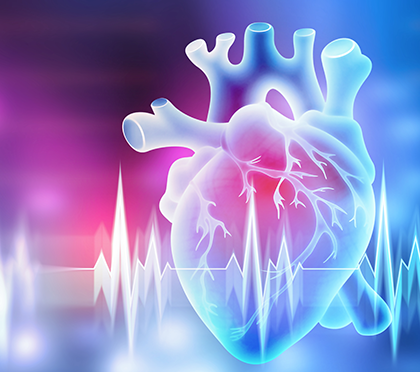Cardiology care tips for an optimal cardiovascular life
Wiki Article
Understanding the Significance of Cardiology in Modern Health Care Providers
Cardiology plays a crucial duty in modern healthcare, especially as cardiovascular disease remains to be the leading reason of death worldwide. Breakthroughs in diagnostics and treatment have transformed client care, enabling earlier interventions and improved outcomes. The shift towards precautionary cardiology equips individuals to manage their wellness proactively. As modern technology proceeds to advance, the integration of innovative solutions might better redefine cardiology's influence on public health and wellness, triggering a closer evaluation of emerging trends and their effects.The Frequency of Heart Illness and Its Influence On Public Health
Although heart disease remains the leading cause of fatality internationally, its impact expands much beyond individual people to impact public health systems and economies. The high occurrence of heart problem positions a considerable stress on health care resources, requiring boosted funding for prevention, therapy, and rehabilitation programs. Public wellness campaigns should resolve danger variables such as weight problems, smoking, and inactive way of livings, which contribute considerably to the rising incidence of heart conditions.Moreover, the financial burden connected with heart condition is immense, incorporating not only straight clinical costs however additionally indirect expenditures associated with shed performance and premature mortality. Neighborhoods encounter obstacles in managing these prices, commonly leading to disparities in health care accessibility and end results. As the populace ages and lifestyle-related risks remain to rise, the necessity for effective cardiology interventions ends up being vital. Subsequently, addressing heart disease is not only a matter of individual health and wellness however likewise a critical public health priority.Developments in Heart Diagnostics and Imaging Techniques
Recent developments in cardiac diagnostics and imaging techniques have actually reinvented the field of cardiology, improving the capability to keep track of and spot heart problem. Methods such as cardiac MRI, CT angiography, and echocardiography have become significantly advanced, providing comprehensive photos of heart frameworks and features. These methods permit the early identification of problems like coronary artery disease, heart failure, and valvular disorders.Moreover, developments in non-invasive diagnostics, such as wearable innovation and remote tracking gadgets, have actually encouraged people and medical care carriers. These tools help with real-time monitoring of heart rhythms and various other important indicators, causing timely treatments. Additionally, synthetic knowledge is being integrated right into imaging analysis, boosting accuracy and performance in diagnosis.Developments in Therapy Choices for Heart Issues
Recent innovations in cardiology have caused significant advancements in treatment choices for heart disease. These include innovative surgical methods that enhance procedural results and emerging medicines that supply new opportunities for treatment. As the field progresses, these innovations play a crucial role in enhancing individual treatment and outcomes.Advanced Surgical Techniques
Advancements in medical methods have actually transformed the landscape of cardiology, providing brand-new wish for patients with heart disease. Minimally intrusive treatments, such as catheter-based interventions, have substantially reduced healing times and health center stays. Techniques like robotic-assisted surgical treatment improve accuracy, permitting surgeons to navigate complex anatomical structures with higher precision. Developments in imaging modern technology facilitate real-time visualization during procedures, boosting outcomes. Transcatheter aortic shutoff substitute (TAVR) exhibits an advancement in treating aortic stenosis, allowing valve replacement without open-heart surgery. In addition, hybrid strategies that incorporate medical and catheter-based approaches offer tailored solutions for numerous heart issues. These advanced medical strategies not just improve client safety but likewise expand treatment alternatives, emphasizing the essential function of development in modern cardiology practices.Arising Medications and Treatments
As the landscape of cardiology proceeds to advance, arising medicines and therapies play a pivotal duty in improving treatment alternatives for heart conditions. Developments such as unique anticoagulants and progressed lipid-lowering agents have transformed the monitoring of heart diseases, substantially decreasing patient morbidity and mortality. In addition, the advancement of genetics therapies and regenerative medication provides encouraging opportunities for dealing with problems previously considered irreversible. Professional trials are continually exposing the efficacy of these treatments, pushing the borders of conventional therapies. The combination of electronic health innovations promotes personalized medication, permitting for tailored therapy strategies based on genetic and way of life aspects. Jointly, these developments highlight the vibrant nature of cardiology, enhancing person outcomes and redefining standards of care in contemporary medical care.The Duty of Preventive Cardiology in Patient Care
Precautionary cardiology plays a necessary duty in person care by concentrating on the recognition of danger variables that add to cardiovascular disease. Through lifestyle adjustment strategies and very early discovery methods, healthcare carriers can effectively reduce the incidence of cardiovascular events - Cardiology. This aggressive technique not just enhances client results however also promotes lasting wellnessDanger Aspect Identification
While cardiovascular conditions stay a leading source of morbidity and mortality worldwide, reliable threat aspect identification acts as a keystone of preventative cardiology. Identifying danger elements such as hypertension, diabetes mellitus, family members, and hyperlipidemia history is essential for very early treatment. Health care professionals make use of various evaluating techniques to evaluate these variables, enabling tailored preventive actions. In addition, understanding a person's lifestyle selections, such as cigarette smoking and physical inactivity, additionally informs threat assessments. This thorough examination enables medical professionals to develop tailored care plans focused on mitigating risks. By focusing on threat variable identification, medical care systems can enhance client end results and decrease the general burden of heart diseases, inevitably contributing to enhanced public wellness techniques and source allocation.Lifestyle Adjustment Methods
A multitude of studies highlights the crucial role of lifestyle adjustment techniques in decreasing heart disease danger. These methods incorporate dietary changes, raised physical task, smoking cessation, and weight administration. By embracing a heart-healthy diet rich in fruits, vegetables, whole grains, and lean healthy proteins, individuals can decrease cholesterol degrees and high blood pressure. Regular exercise strengthens the heart and boosts overall cardiovascular health. Additionally, quitting smoking considerably minimizes the danger of heart condition and boosts recuperation prices for those with status quo. Weight administration additionally contributes to cardiovascular health and wellness by minimizing various other danger factors such as diabetes and hypertension. Implementing these way of living transforms not just promotes specific wellness however also serves as a keystone of preventative cardiology in individual care.Early Discovery Strategies
Way of life modifications significantly add to lowering cardio disease risks, yet they are most reliable when coupled with early discovery methods. Preventive cardiology stresses the relevance of determining potential heart issues prior to they escalate right into major conditions. Strategies such as blood pressure monitoring, cholesterol screening, and advanced imaging technologies like echocardiograms play crucial duties in assessing cardio health and wellness. Biomarkers and genetic screening also boost the accuracy of very early detection, permitting tailored preventative methods. Normal cardiac threat examinations encourage health care companies to interfere proactively, potentially protecting against cardiovascular disease and strokes (Cardiology Jupiter). By incorporating these early discovery approaches into regular care, patients can take advantage of prompt way of life treatments and targeted treatments, inevitably enhancing and enhancing results quality of lifeIntegrating Technology Into Cardiology Practices
As innovations in modern technology remain to improve various areas, the combination of cutting-edge devices and systems right into cardiology practices has actually come to be vital for boosting person treatment and end results. Telemedicine systems allow cardiologists to keep track of people from another location, boosting access to care while decreasing the problem on health care centers. Wearable tools, such as smartwatches, enable constant heart price tracking, signaling both people and medical professionals to potential problems in real-time. Additionally, expert system (AI) is being used to assess substantial amounts of heart data, aiding in very early diagnosis and tailored therapy strategies. Advanced imaging methods, including 3D echocardiography, boost visualization of heart frameworks, bring about extra specific treatments. Digital health and wellness records (EHRs) streamline person information monitoring, making certain that cardiologists have immediate accessibility to important data. Together, these technological developments are transforming cardiology, promoting aggressive administration and enhanced health end results for people with cardio problems.The Importance of Patient Education And Learning and Engagement
Person education and involvement play webpage a critical duty in the management of cardio health. By equipping clients with expertise regarding their problems, treatment choices, and lifestyle adjustments, healthcare service providers encourage individuals to take an active function in their treatment. This proactive technique can lead to enhanced adherence to recommended medications, dietary modifications, and workout regimens, ultimately minimizing the danger of complications.Engagement also cultivates a solid patient-provider partnership, encouraging open interaction and count on. When individuals really feel educated and included, they are most likely to voice worries and ask questions, which can cause far better clinical end results. Furthermore, academic sources, such as workshops or electronic systems, can boost understanding and advertise self-management approaches. Generally, focusing on individual education and involvement is necessary for boosting cardio wellness, enhancing quality of life, and lowering medical care prices linked with heart diseases.Future Fads in Cardiology and Their Possible Effect

Often Asked Concerns
What Lifestyle Changes Can Lower Heart Condition Risk?
The present question addresses way of life modifications that can substantially minimize cardiovascular disease threat. Cardiology Jupiter. Embracing a well balanced diet, taking part in routine exercise, maintaining a healthy and balanced weight, handling stress, and staying clear of cigarette can notably improve cardiovascular health and wellnessHow Can I Recognize Very Early Signs of Heart Issues?
Acknowledging early signs of heart troubles includes tracking symptoms such as chest pain, shortness of breath, fatigue, and irregular heartbeat. Timely understanding of these signs can prompt needed clinical assessment and intervention for better end results.What Are the Distinctions In Between Cardiologists and Cardiac Surgeons?
The differences in between cardiologists and cardiac specialists hinge on their functions; cardiologists this website primarily manage and identify heart disease through non-invasive methods, while heart doctors do operations to correct structural heart issues. Each plays an essential, unique function.
Just how Commonly Should I Get My Heart Wellness Checked?
The frequency of heart health and wellness checks varies based upon individual threat aspects. Generally, grownups need to undergo assessments each to 2 years, while those with current problems might require more constant evaluations as recommended by healthcare specialists.What Function Does Genes Play in Heart Problem Threat?
Genes considerably affects heart problem risk, with familial patterns indicating inherited conditions. Details genetics can incline individuals to high blood pressure, cholesterol issues, and various other cardio issues, highlighting the importance of hereditary screening in reviewing heart health. Heart disease remains the leading cause of death around the world, its influence expands much past specific people to influence public health and wellness systems and economic situations. Public wellness initiatives should resolve risk aspects such as obesity, smoking cigarettes, and sedentary way of lives, which add considerably to the climbing occurrence of heart conditions.Moreover, the economic problem associated with heart disease is enormous, incorporating not only straight medical expenses yet also indirect expenses related to shed productivity and premature mortality. Preventive cardiology plays an essential role in client care by concentrating on the recognition of threat factors that add to heart condition. Synthetic intelligence (AI) and maker understanding are enhancing diagnostics and client monitoring, allowing great post to read early discovery of heart illness. The distinctions in between cardiologists and cardiac specialists lie in their functions; cardiologists mostly identify and handle heart conditions through non-invasive techniques, while cardiac cosmetic surgeons carry out surgical procedures to fix architectural heart concerns.Report this wiki page